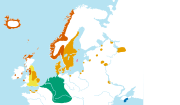Latin characters. In linguistics, the Indo-European ablaut (/ˈæblaʊt/ AB-lowt, from German Ablaut pronounced [ˈaplaʊt]) is a system of apophony (regular...
28 KB (3,501 words) - 07:55, 20 August 2024
Apophony (redirect from Ablaut reduplication)
In linguistics, apophony (also known as ablaut, (vowel) gradation, (vowel) mutation, alternation, internal modification, stem modification, stem alternation...
24 KB (2,017 words) - 17:05, 15 September 2024
Proto-Indo-European language (section Ablaut)
(analogous to English child, child's, children, children's) as well as ablaut (vowel alterations, as preserved in English sing, sang, sung, song) and...
63 KB (5,750 words) - 20:36, 28 September 2024
Lakota language (section Ablaut)
as a/aŋ-ablaut, e-ablaut, and iŋ-ablaut respectively. Some words are ablauted by some and not others, like "gray" hóta or hótA. Ablaut always depends on...
66 KB (6,943 words) - 03:14, 16 September 2024
and exhibited a complex pattern of accent shifts and/or vowel changes (ablaut) among the different cases. Two declensions ended in a vowel (*-o/e-) and...
57 KB (5,233 words) - 08:41, 31 May 2024
Proto-Indo-European phonology (section Ablaut)
or the ending. These words also had no ablaut variations within their paradigms. (However, accent and ablaut were still associated; for example, thematic...
49 KB (6,272 words) - 13:01, 6 September 2024
ancestral Proto-Indo-European (PIE) language. In PIE, vowel alternations called ablaut were frequent and occurred in many types of word, not only in verbs. The...
126 KB (12,137 words) - 16:24, 9 September 2024
In some cases, a noun pluralizes by stem ablaut without suffixation; one example of unsuffixed plural ablaut is æ̀-ɣata ('crocodile'), which is pluralized...
23 KB (2,598 words) - 19:33, 31 March 2024
zero-grade of ablaut, lack of suffix / nasal infix The second or strong aorist uses the bare root of the verb without the e of ablaut or the present-tense...
24 KB (2,752 words) - 07:49, 30 May 2024


